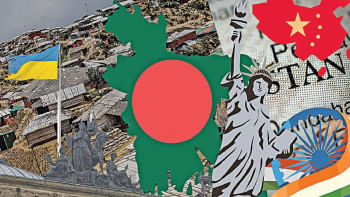Reading Rokeya through the lens of 1857-58 and July 2024

People of the Indian subcontinent, especially those in Bengal, never accepted European colonial rule. They launched many waves of anticolonial resistance since the arrival of the coloniser in the early 16th century. The most decisive—and of tragic consequences—was the Great Rebellion of 1857-58 (Mahabidroh) which the British mischaracterised as "Sepoy Mutiny." It was begun by the sipahis of the Bengal army.
The epicentre of the war that followed was Delhi where the sipahis and other freedom fighters flocked. By that time, Mughal rule under its last emperor Bahadur Shah Zafar shrunk to Delhi and its surrounding areas. The freedom fighters declared him Badshah-e-Hind (the emperor of India) and the symbolic leader of the revolt. Mainly due to the treachery of local sell-outs, informants and opportunists, the uprising failed.
After quelling the revolt, the British perpetrated mass murder, rape, lawfare, confiscation of property, and similar human rights violations, whose primary victims were the Muslim community. Tens of thousands of people were slaughtered. At one point, with revolver shots from a point-blank range, British cavalry officer William Hodson killed members of the Mughal royal family, including Mirza Mughal and Mirza Khizr Sultan. Their severed heads were then presented to their father, Bahadur Shah Zafar.
In a 2011 Routledge essay titled "The Backlash in Delhi," historian Arshad Islam says, "The British soldiers started looting, plundering, and demanding money. However, after gorging money they put to the sword Hindus and Muslims indiscriminately, but later they only fell upon the Muslims," women being the worst sufferers.
Delhi and other cities affected by the rebellion were littered with "heaps of dead bodies" and presented "an awful spectacle." Fearing death and dishonour at the hands of colonial forces, "men, women, and children were roaming barefooted … Mothers who could not bear the miseries of their [hungry] children threw themselves into wells" and innumerable women committed suicide to guard their chastity. Many surviving Muslim women of respectable families—including descendants of Bahadur Shah Zafar—later lived as beggars and domestic helpers.
This landmark event had massive impacts on the subsequent relations between the coloniser and the colonised in the region. The following discussion sheds some light on the self-censorship practices of native writers in its aftermath.
Many anticolonial rebels suffered penal servitude and died in the dreaded island prison of the Andamans. One of them was great writer and jurist Fazl-e-Haq (also spelt Fadl-i-Haqq) Khairabadi (1796-1861)—honourably known as Allamah (a great scholar)—on whom poet Intizamullah Shahabi wrote an essay titled "Allamah Fadl-i-Haqq." In 1953, introducing the essay in the Journal of the Pakistan Historical Society, its editor commented on the cultural context of the aftermath of the rebellion, "[Writers of the subcontinent] were overcautious in their statements because they could not afford to be listed among 'political suspects.'"
In his essay, Shahabi states, "In the period that followed the catastrophe of 1857 it was not possible to say or write anything against the British rule … For several decades after the War it was impossible to talk of liberation or independence … [E]ven those who wrote in the earlier decades of the twentieth [century], could not carry us far."
Roquiah Sakhawat Hossein (1880-1932), more popularly known as Rokeya, was born about two decades after the Great Rebellion and wrote in the first few decades of the 20th century. In her work, the Great Rebellion is conspicuous by its absence. Given the lethality of the British response to the uprising, Rokeya had to be sensitive to the political-cultural context in which she operated. This explains the omission of any prominent mention of the uprising in her oeuvre. However, a thematic analysis of her work shows that the spectre of the event was always there at the back of her mind.
Rokeya's writings are rife with laments on the deplorable condition of Muslims in British India. She sought to lift them from the abyss of wretchedness and from the ills and adversity brought on them by colonial rule. The strategy through which she wanted to materialise this project of ameliorating the condition of Muslims was women's emancipation. She established a link between the liberation of Muslim women and the overall development of Muslim society. For example, in a 1926 speech delivered at Bengal Women's Education Conference, Rokeya said,
"As the British Government does not recognise the demands of Indian peoples … [and] our non-Muslim neighbours do not tolerate the interests of Muslims … in the same way Muslim men refuse to recognise women's desire for progress … Unless and until our Muslim brothers give proper attention to our [women's] sufferings, the 220 million people of India will not give any heed to their demands; and unless and until those 220 millions ignore the 80 million Muslims, their petition will not reach the ears of the British government."
Thus, she pointed to the embedded connection between the public and the private long before latter-day feminist scholars theorised these inherent underpinnings. In her short stories such as "Gyanphal," "Muktiphal" and "Bhrata O Bhogni" and essays like "Asha-Jwuti," Rokeya sent the same stark message—to those who wanted to decolonise their country—that without making women equal partners in every sphere of life, it would be impossible to achieve liberation, especially from colonial rule.
My decades-long research on the life and work of Rokeya shows that she didn't seek to improve the condition of women alone. She wanted to break the imperial shackles and to liberate the people of the subcontinent from colonial subjugation, and the key to that liberation, according to her, was the emancipation of women.
It is true that Rokeya refers to Muslim women and Muslim society again and again in her work. This repeated mention should be understood in the broader context of the double colonisation of Muslim men (as Muslims and Indians) and the triple colonisation of Muslim women (as women, Muslims and Indians)—all were exacerbated after the failed 1857-58 uprising. She sought to alleviate the plight of the victimised and the marginalised. Therefore, when discussing Rokeya, we cannot keep the here and the now at a distance.
For example, people in Bangladesh suffered many human rights violations, from enforced disappearances to mass killings in the streets, during Sheikh Hasina's rule from early 2009 to August 5, 2024. We saw our banks plundered and our money syphoned off to foreign shores through capital flight. Opposition political parties were suppressed (and "managed") and couldn't do much to rescue the nation from what is now widely regarded as Hasina's fascism. Finally, our students and other young people—both male and female—braved the risk of street death by shooting (in the head) by government forces. In July 2024, they sparked a formidable movement and gave their lives for the love and liberation of their country. The selflessness, courage and heroism of tens of thousands of surviving young people eventually defeated the greed and cruelty of Hasina and her lickspittles.
Recently, while studying the 1857-58 rebellion and its aftermath, I shuddered with horror thinking of the dreadful consequences had the July uprising failed and Sheikh Hasina remained in power. This also tells me about the heavy burden of the post-1857-58 collective trauma among the Muslim community that Rokeya had to process while she was writing. It is important to consider this aspect of Rokeya's literary career while reading her work. Equally, in order to make our struggle for gender justice relevant and efficacious, we can't turn a blind eye to the larger political context that affects the lives of both men and women.
Dr Md Mahmudul Hasan is professor in the Department of English Language and Literature at the International Islamic University Malaysia. He can be reached at [email protected].
Views expressed in this article are the author's own.
Follow The Daily Star Opinion on Facebook for the latest opinions, commentaries and analyses by experts and professionals. To contribute your article or letter to The Daily Star Opinion, see our guidelines for submission.

 For all latest news, follow The Daily Star's Google News channel.
For all latest news, follow The Daily Star's Google News channel. 











Comments